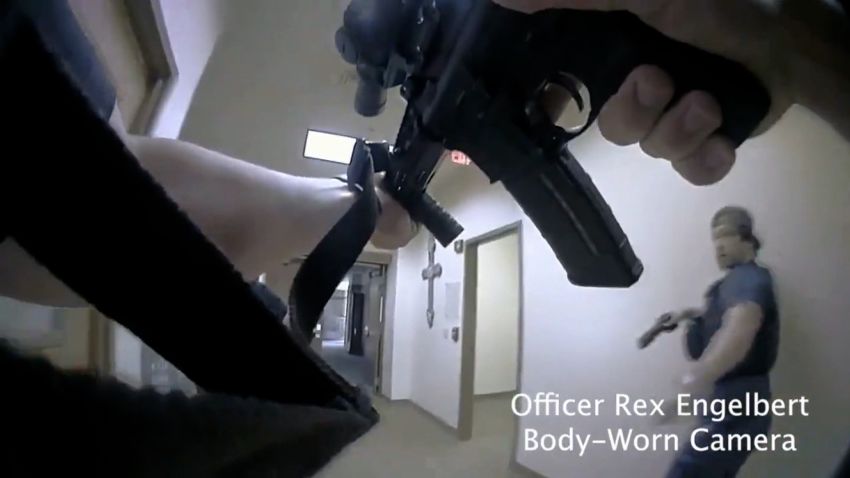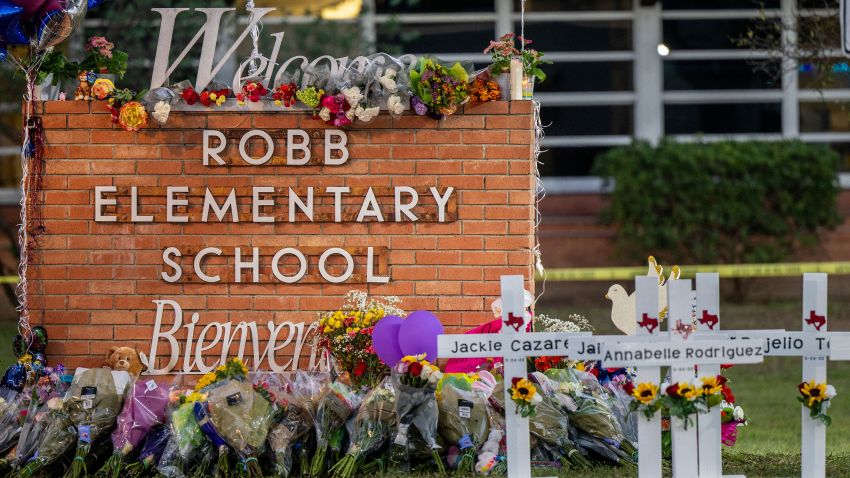[ad_1]
CNN
—
Two active shooters in two elementary schools, both armed with assault rifles and both ready to kill. Police in both Uvalde, Texas, last May and Nashville just this week rushed to answer 911 calls of gunfire.
But while the Nashville shooter was stopped within minutes, with six innocents killed, it took well over an hour for the Uvalde siege to end. Nineteen children and two teachers died in Uvalde, though at least three of the victims had survived the initial gunfire.
The response in Uvalde was “an abject failure,” according to Texas’s top cop, Col. Steven McCraw, director of the state’s Department of Public Safety. In Nashville, it was “a textbook operation by law enforcement that was executed flawlessly,” said Jonathan Wackrow, a former Secret Service agent and CNN analyst.
Here are the key differences, and some similarities, reported from a CNN analysis of body camera footage from both instances and interviews given to investigators after the Uvalde massacre that have been obtained by CNN.
Body camera footage shows police hustling to both scenes.
In Uvalde, Robb Elementary comprised separate buildings connected by breezeways. Officers coming from different directions could hear gunfire and used that to identify the right location, entering the westernmost building where the gunman was. They then tried to direct each other on radios.
In Nashville, a woman who appears to be a Covenant School staffer meets one of the first responders, Officer Rex Engelbert, and tells him: “The kids are all locked down. We have two kids that we don’t know where they are.”

Police release bodycam from officers responding to school shooting
Engelbert is handed a key, opens the locked entry door and, with other officers already arriving, calls out to form a team. “Give me three, let’s get three!” he said. “Let’s go! I need three!”
In Uvalde, the sound of gunfire led officers from the school and city police forces to the building the shooter was in. Smoke, bullet casings and broken glass showed the room he had entered. Four officers came up the hallway in one direction and three from the opposite end. As they neared the connected classrooms where the gunman had already fired 100 or so rounds, bullets came through the door and they retreated. No one touched the unlocked door or saw the shooter in the darkened rooms.
Sirens were blaring and emergency lights flashing as officers from the Metropolitan Nashville Police Department entered the Covenant School building. With no initial sound of gunfire, they started to search room by room. The footage shows one officer opening a door and another leading the way inside, each saying what they find as they clear rooms and move on. “Next! Let’s go,” said Engelbert.
Most officers were on the first floor when the sound of gunfire drew them upstairs. “Shots fired! Shots fired! Shots fired! Move!” said Officer Michael Collazo. They pass an apparent victim on the floor but do not stop. “Keep pushing,” is heard. In a different part of the building, Engelbert urges colleagues to “go, go, go!” towards the sound of gunfire.

New bodycam footage reveals confusion between Uvalde officers
It’s a marked difference from Uvalde.
After being shot at through the door at 11:37 a.m., the officers in Uvalde retreated. One began to head back towards the key classrooms – 111 and 112 – but no one followed him. It appears that no one got close to the classroom doors again until 12:50 p.m., when a team led by Border Patrol agents burst in and killed the gunman. There was a forward surge after shots were fired in the classroom at 12:21 p.m., but no one went in.
Throughout the 73 minutes between 11:37 a.m. and 12:50 p.m. there was never a crescendo of voices calling for action. Sometimes one officer or another would note that things were taking too long, but others would point to those they thought were in charge or just wonder if the shooter was already dead.
And with no effective communication with each other or school administrators, there was confusion about whether children and teachers were trapped.
The firepower of both attackers and responders in the shootings was similar but, again, the approach and results differed.
In Uvalde, responding officers realized the shooter had a high-powered assault rifle, given the bullet casings they saw and by how the shots were piercing sheetrock. That seemed to have cowed then-school district police chief Pedro “Pete” Arredondo, who called the city police dispatcher and said: “He has an AR-15. He shot a whole bunch of times … He’s in one room. I need a lot of firepower, I need this building surrounded, surrounded with as many AR-15s as possible.”
Arredondo was armed with his pistol but there were officers with long guns at Robb Elementary by 11:40 a.m. at the latest. And as more officers arrived, more equipment did too – including the rifle-rated ballistic shield that was eventually used when the team went in the classroom.
Nashville responders were similarly equipped, wearing their regular protective vests, some with helmets, some without. Engelbert carried a rifle while Collazo had only his sidearm.
Collazo encouraged those with greater firepower to be first in to rooms to be cleared, “Rifle first! Rifle first!” But he did not hesitate before heading towards the sound of gunfire.
The Nashville shooter was armed with three firearms: a 9mm pistol caliber carbine, a 9mm handgun and an assault-style rifle.
As Nashville officers converged on the open area where the shooter was, one of them noticed something vital. “Reloading!” was shouted out a split second before Engelbert fired four times at the suspect.
A shooter reloading is seen as a critical opportunity for responders as the attacker is engaged and cannot fire.
Arredondo told those investigating what happened in Uvalde that he thought he heard the shooter reload at least once, perhaps twice, as he called out to try to negotiate. No action was taken at that time to get into the classrooms.
None of the responding officers in Uvalde saw the gunman until they entered Classroom 111 and he came out of a supply closet firing at them, and they killed him. The blinds were down and lights off in the classrooms. The classroom entry doors had narrow glass windows but officers reported they could not see through them.
Running into an upstairs atrium, the Nashville officers came upon the shooter alone, seconds after gunfire was heard and they had clear shots. Engelbert fired four shots and Collazo fired four more times before they confirmed the shooter was down.
Another notable difference between the two responses is simply the release of the body camera videos.
All material related to the Robb Elementary response has been kept secret under orders of local District Attorney Christina Mitchell Busbee. Uvalde Mayor Don McLaughlin went against the DA and published the videos from the Uvalde PD officers under his jurisdiction weeks after the attack. CNN has obtained and reported on many more recordings and what they show, but they remain withheld from the public.
Nashville police released the body camera footage from the two officers who killed the suspect less than 24 hours later.
[ad_2]
Source link





